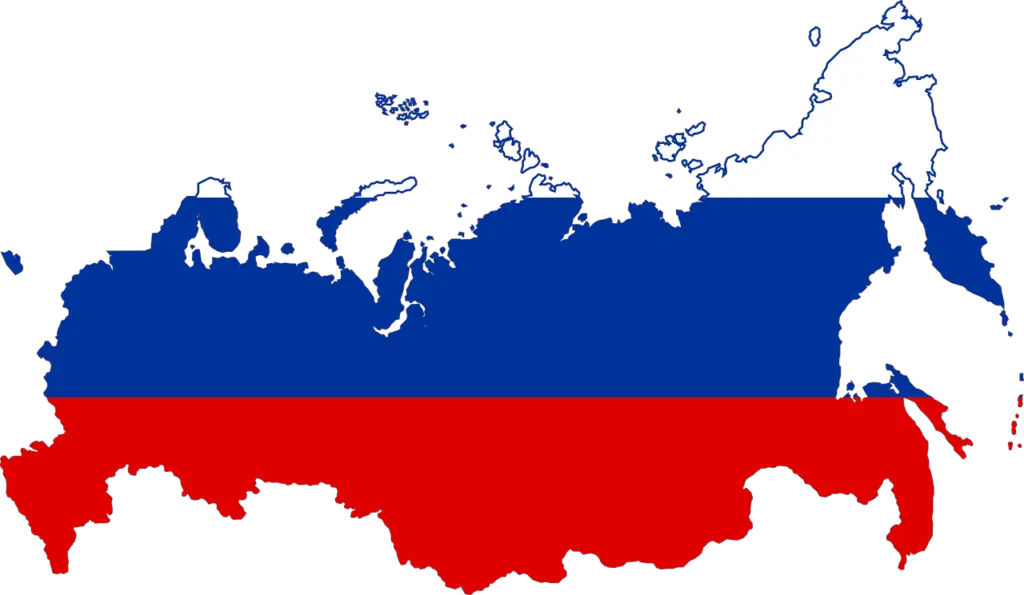
Russia is the largest country by landmass in the world, covering all of Northern Asia, and has 145 million residents. Eighty-one percent of those people speak Russian as their only language, but there are over 100 minority languages. Even with all those languages, Russians are interested in learning English.
The amount of Russian English speakers is moderate to low when compared with the top 100 countries where English is spoken as a second language. Traditionally low Russian motivation to travel and work for multi-national companies is increasing. This has raised the demand for English courses.
If you are interested in how English is spoken in Russia, read on. We will discuss the most common places to find English speakers and some of the reasons Russians have trouble learning English.
Contents
- 1 Cities Where English is Spoken
- 2 Russian English Fluency Compared With The World
- 3 Why Don’t Many Russians Speak English?
- 4 The Study of English is Growing in Recent Years
- 5 Reasons for Russians to Speak English
- 6 English is a Difficult Language for Russians
- 7 There are More English Speakers Every Year
- 8 Learn Basic Russian Phrases – They Will Appreciate The Effort
- 9 Final Talking Point for Spoken English In Russia
Cities Where English is Spoken
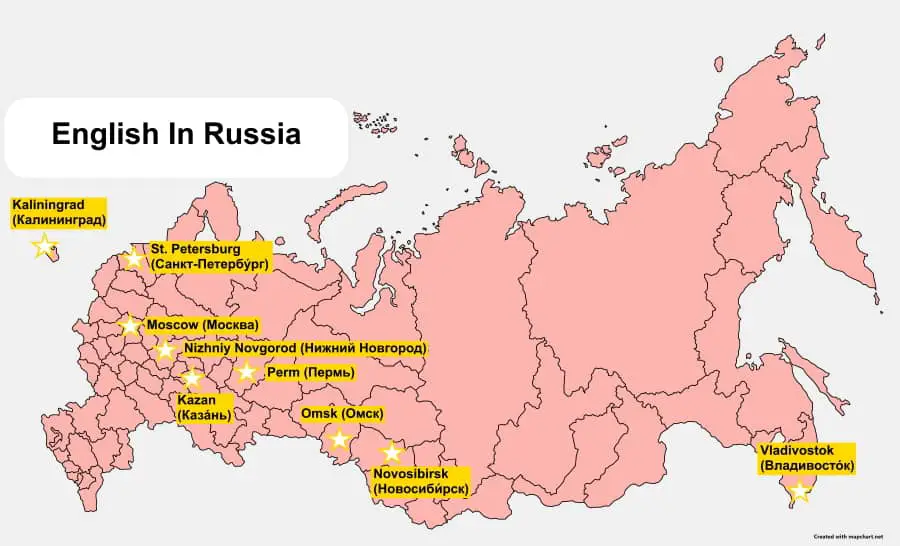
You will be most likely to find English speakers in Russia’s larger cities. These cities are where universities and business headquarters are located, so a higher proportion of people are learning English and using it for their jobs.
According to a survey that looked at the number of schools that taught English, the number of students passing international language exams, and the demand for English speakers in the job market, the cities with the highest number of English speakers are:
Moscow (Москва): The capital of Russia, home to the largest medieval fortress in the world (the Kremlin), and is home to the largest number of billionaires in the world. This world famous city is the center of diplomacy and business for the country which brings with it the need for English.
Many universities here teach English and Moscow has one of the largest. The Moscow State University owns the largest university building in the world. Though the English for the average citizen may be lower, in this city and especially around its universities, English may be a bit easier to find.
In Moscow and other cities of Russia, you will have more luck around the most visited tourist destinations as well. Here some of the top ones are the Red Square, the Kremlin and St. Basil’s cathedral. As you can see from the video below, if you are in Moscow and need to find an English speaker, try to find someone of college age near a university or popular tourist location. That is your best bet.
St. Petersburg (Санкт-Петербу́рг): Founded by Peter the Great, this port city on the Baltic is Russia’s connection to Northern Europe. A trade and cultural center, it is also a popular tourist destination. This alone makes English easier to come by in this city.
Some of the major tourist attractions around the metropolitan area will offer the best chances at finding Russian English speakers. Some of the places to look out for are the Hermitage (Russia’s most famous museum), the subway system (one of the deepest in the world), and St. Isaac’s Cathedral (the fourth largest in the world).
There are 32 institutions of higher education in St. Petersburg. What that spells for the traveler, exchange student, or business professional is… English. These institutions hold a higher degree of certainty when searching for English speakers. Some even major in English as a second language.
Novosibirsk (Новосиби́рск): This is the third most populous city in Russia and the largest in Siberia. Its status as the largest in the Asian part of Russia means that it is a hub for education and business. When these two things are combined with a large population in many countries, English becomes easier to find.
It is a cultural and arts center as well. The Novosibirsk Opera and Ballet Theatre is not only the largest in Russia, beating out Moscow’s Bolshoi Theatre, it is the second largest in the world. With Siberian State University and the Novosibirsk State University both located in the city, the education plus arts culture there raises the level of English.
With its massive transportation system, road network, and massive footprint, Novosibirsk is actually the largest municipality in Russia. This lends itself to many travelers, students, and business professionals alike.
Kazan (Каза́нь): This is considered the third city of Russia after Moscow and St. Petersburg due to its cultural significance to the Tartar people. As the capital of Tatarstan, its residents are bilingual in Russian and Tatar. Its landscape is dotted with art, culture, and musical attractions. It is home to over 40 museums.
It also has over 30 universities, making it full of young people eager to learn a foreign language. The foreign language that has been unofficially adopted by the scholarly community especially in the sciences and mathematics is English. Not only this, many students in these universities study western culture, history, and language.
It is older than Moscow, but it is considered one of Russia’s most modern cities. The traces of its many eras can be seen on its skyline, but it all blends together to form a uniquely modern city with ancient ties. Keeping with its modern leanings, the multi-cultural makeup of the city invites many languages, English being one of them. The fact that the Kazan Kremlin is a UNESCO World Heritage Site speaks to its long history.
Vladivostok (Владивосто́к): This is a major port city near the border with China and North Korea. Its importance as a trade destination means that international companies have offices there. It has seen some recent major construction including the Primorsky Opera Theatre, some major bridges and a massive university campus.
Far Eastern University is the top rated school in the area. Like with most other cities with university areas, English becomes a high priority. It focuses on high tech research, the sciences, and medical research. In all of these academic fields, English is considered the international language of choice by many.
Nizhniy Novgorod (Нижний Новгород): During the Soviet era, this city was home to the military and closed off to tourists. It is now a popular location for Hollywood to film movies. The entertainment industry has probably led to a higher number of English speakers.
With much of the worlds top media and entertainment dominated by the English language from many parts of the world, this is no surprise. With the loosening of the reigns on its people, international influences have slowly entered Russia and the English language included.
Omsk (Омск): Another Siberian city, it is a major industrial center. Russia’s major engineering and metalworking companies are headquartered here. With the high tech machinery needed for this industry and the business connections needed internationally, it is likely to find English at least in some way in this city.
Kaliningrad (Калининград): Formerly known as Königsberg, this city is in a region entirely separated from the rest of Russia. It was part of Germany and claimed by Russia after WWII. Poland and Lithuania border the region of Kaliningrad Oblast. As part of Europe proper and as is the tradition in Northern Europe, this small area has a decent amount of English speakers.
Perm (Пермь): The last major city in the European part of Russia. It hosts several important international festivals each year. The international connection and its direct connection with Europe lends it to be above the average in terms of English speaking in Russia.
Every wanted to start learning Russian. Are you wanting to get some basics under your belt for business or personal travel? I would recommend an all in one solution that can get you past the beginner stages and into the intermediate levels.
Russian is a notably difficult language for English speakers to learn. You will want to have a step by step guide. Rocket Languages is what our family uses to learn languages to the intermediate levels. Try a free trial of Rocket Russian here.
Russian English Fluency Compared With The World
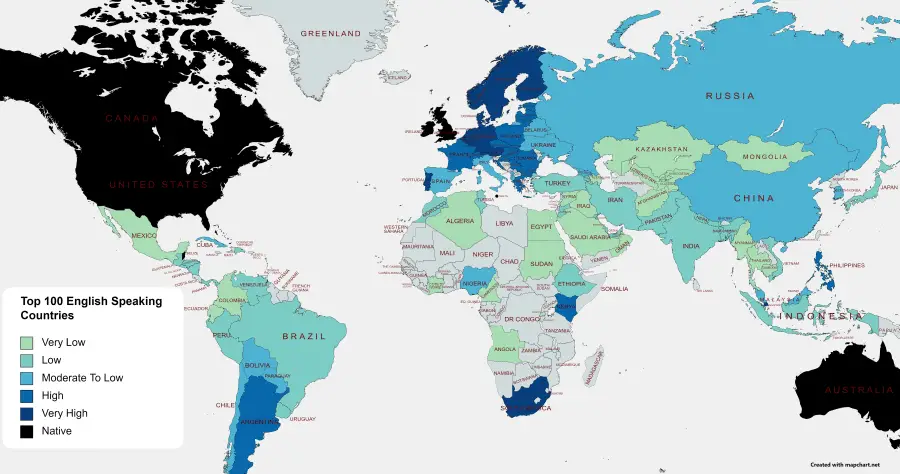
Russia overall when compared to the rest of the world according to the English proficiency index is in the moderate to low position when it comes to the amount of English speakers it has. This doesn’t speak to their proficiency in the language, but only to the amount of people that have some level of communicative ability.
This doesn’t mean that Russia is lagging behind the rest of the world. With English’s growth in popularity in Russia and the low state of English in many parts of the world Russia is actually quite progressive in its English language advancements. The Russian people have a long road ahead to reach the English levels of a country like the Netherlands, but in truth, Russia is not like the Netherlands in many ways.
With its political system, culture, and history so foreign to Native English speaking people, it is not surprising that over the past century it has not been affected by the trend toward incorporating English into its society. This is coupled with the fact that for Russians, English is an especially difficult language to learn.
As a contrast, see my article here about how common spoken English is in Sweden.
Russian English Speakers Vs Europe
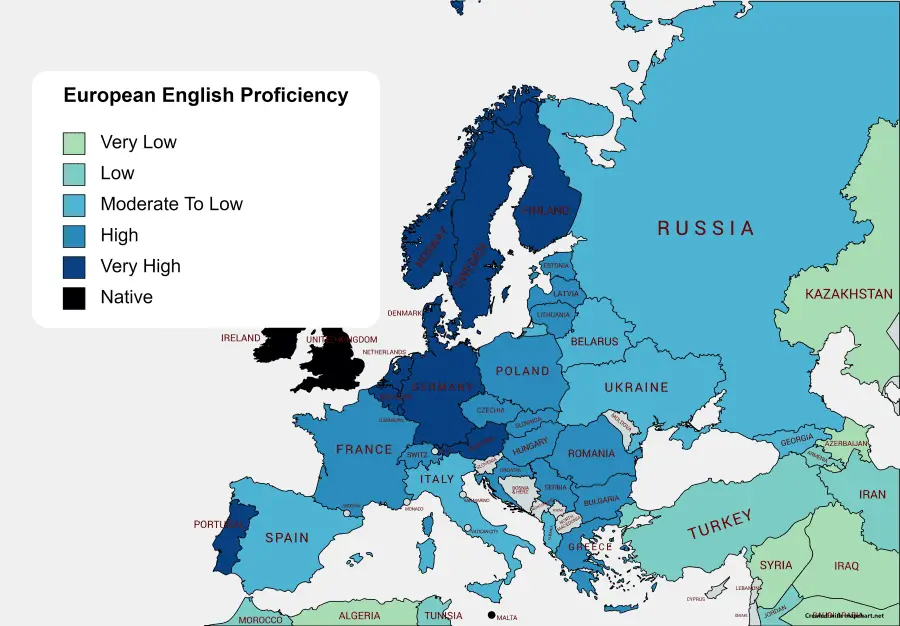
When we focus the lens a bit closer and look at the level of English in Russia as compared to the level in Europe, a different story emerges. This comparison is where many get the idea that Russia has rejected the English language possibly because of the Western Culture in general. When looked at against the levels of English in Europe, Russia is definitely well behind.
The the turmoil of the 20th century placed walls both physical and figurative between many parts of Europe and Russia. It is only since the fall of the Berlin Wall and the independence of a number of the Eastern European nations that tensions at least on the surface have eased.
With this at least temporary openness, English has made advances in both Eastern Europe and Russia. With more international connections come more opportunities for shared language and culture.
Want to see another culture that tends to have low proficiency in spoken English? See my article here on France and the amount of English you are likely to find there.
English In Russia Vs Asia
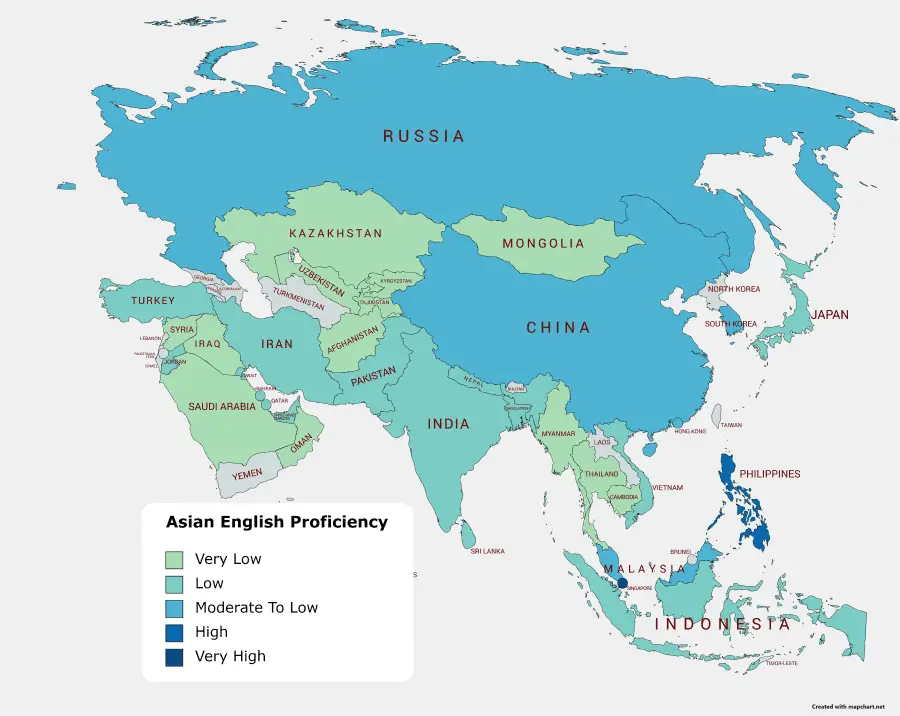
When the level of English in Russia is compared with the levels on the Asian continent, China and its neighbor to the north almost seem like Anglophone societies. This is absurd of course, but the level of English in the rest of Asia and the Middle East is low to very low nearly in every case.
Russia has ties to the world economies, diplomacy, and higher education that many of these smaller and poorer countries do not have. This makes it more advantageous for the governments and peoples of places like Russia and China to put forth the effort to learn English.
Other than the Philippines and Malaysia, the major nations of Russia and China are the main source of English on the Asian continent. This probably says more about the other countries in Asia than about Russia.
Why Don’t Many Russians Speak English?
There are several reasons that Russians don’t take to English like other peoples in other nations. These range from the cultural to the political and from the technical and practical.
Russians Don’t Tend To Travel Internationally
Russians tend to not travel outside of their country as much as other cultures. There is also a sense that international travel is not necessary. Many people may have heard of it, but not a lot of people have ever looked into exactly how big the Russia actually is. It is huge.
Many Russians are of the mindset that English simply isn’t needed in the largest country in the world. A little known fact is that 72% of Russians don’t even have a valid passport and 59% have never traveled abroad in their lives.
Russia is not only larger than the second country on the list (Canada), it is nearly twice its size. With Russians having 11% of the earth’s land mass, they really don’t feel as if they need to go anywhere else.
English Instruction in Russia is Outdated and Primarily Grammar Based
This is coupled with the fact that nearly everything they need is within their boarders and all of it is either in Russian or translated into it. Everything from movies, books, websites, etc. is available in Russian no matter where it comes from.
Even when motivation comes from schooling from lower grades on, the instruction found in Russian schools is based on older 1900s English and mostly grammar memorization. Before World War II it was not common to have to speak English even in Europe, and their antiquated instruction methods reflect this.
There Is No English on Russian Television or Movie Screens
There is a general practice in Europe and in many countries with a strong sense of cultural identity in a majority of its people. Dubbing over the voices in original English language television shows and movies is commonplace. My husband and I experienced this in Germany as well.
In Russia, nearly all movies and television coming from the American and British media is dubbed into Russian. Not only is most media dubbed, but Russia also has its own national favorites as well.
Between this and having most all print translated into Russian, English is something that anyone wanting it will have to search for. You simply won’t find English without some effort.
English Is Not Commonly Spoken in the Workplace in Russia
With the immense national market that provides everything the average Russian needs or wants, English simply is not necessary in or outside of the country. There are foreign owned companies in several major cities, but they are not in the majority.
Even in these companies, Russian is the norm even if English is asked for as a skill in many new employees. Some experts claim that though it is asked for, it is simply to weed out less motivated or studious candidates.
International business aside, English is not common in most workplaces. Though this can change in the future, it will take quite a bit of effort to motivate a populace that is simply not interested.
The Study of English is Growing in Recent Years
For many years, English was not widely spoken in Russia or the Soviet Union. Since trade and travel were restricted, there was no real incentive to learn the language unless you needed it for your profession. Russians were more likely to know Spanish and German, as they had close ties to East Germany and Cuba.
Also French in the 20th century was sometimes more commonly spoken by Russians than their native language in upper tiers of society. It was at that time seen as the international language of the educated elite.
However, since the end of the Cold War and the increase in mobility, more Russians speak English than ever before. A survey completed in 2003 revealed that only 16% of respondents claimed to speak any level of English. In 2015, this had risen to 30% (rtbh.com).
One important note is that most Russians with foreign language skills are under 40 years old. Younger college grads and students of English currently in the University system tend to put a higher importance on learning English than did their parents.
As well, the internet has made it much easier for Russians to learn English than it was in the past. Language learners can take courses online and connect to English language materials. According to the Embassy of the United States in Moscow, at least ten dedicated English language media sources in Russia are useful for native speakers and English learners.
Reasons for Russians to Speak English
Russia is a sovereign country, and it makes the most sense to speak the native language there. Why should Russians learn English? To begin with, English has become the global language used in higher education, to conduct business, and participate in diplomacy. I’ve written about spoken English in Sweden, too.)
Other reasons for learning English include:
- Most Widely Spoken World Language: Although there are billions of people who speak languages other than English, particularly Mandarin and Spanish, it has become the second language of the world. It is the most popular language to learn, and you can communicate with people worldwide using English.
- Official Language of 53 Countries: English is the first language of 400 million people. It is also the official language of many countries. This includes obvious ones such as the United Kingdom and the United States, as well as India, Singapore, and Tanzania.
- Language of Tourism: Since so many people speak a little bit of English, it has become the language of tourism. If your native language is not very common, you are more likely to find travel information in English. Shop owners and restaurant staff in Russia do well to learn a little English to communicate with foreign visitors. With Russia becoming a popular travel destination since the end of the cold war, English has taken on a new importance for tourism.
- Good for Getting a Job: In our modern global economies, many corporations have headquarters in an English-speaking country and offices around the world. Knowing English will help a Russian person get a job with an American company in Moscow, even if it may never need to be used.
There are many reasons for Russians to learn English; improving communication skills can help expand their opportunities in life. In a country with restricted media, being able to understand foreign news sources can lead to more knowledge about what is happening in Russia. There are many benefits to understanding English.
English is a Difficult Language for Russians
Russian and other Slavic languages are very different from English, and for that reason, English is a difficult language for Russians to learn. There are sounds in English that don’t exist in Russian, making it hard for learners to hear and duplicate them.
It is a common party joke in Russia and in Europe to put on a thick Russian accent and mangle the English language. This is only an exageration to poke fun at their Russian freind, but it still does have some grains of truth. It is hard for Russians to learn English and it goes both ways. Russian is an especially hard language for English speakers to learn as well.
Other difficulties for English language learners in Russia include:
- Articles: When you hear a Russian person speak English, you will probably notice they drop articles like “a” and “the.” This is because these articles don’t exist in Russian, and it can be difficult to remember them in English.
- Phrasal Verbs: These verbs have an idiomatic meaning beyond their original definition. An example is “blow up.” To blow doesn’t mean what it means in this phrase. Not isolated to Russians, this is a problem for many non-native English language learners.
- Alphabet and Spelling: In many languages, a letter has one pronunciation that never changes. This is not the case in English. The phrase “Pacific Ocean” has three pronunciations of the letter “c.”
With these difficulties, it is no surprise that Russians have trouble learning English. This is a problem for companies hoping to hire English speakers in Russia. Despite high numbers of job applicants claiming to speak English fluently, researchers found that few of them had more than a basic understanding of the language (IATED). For the companies actually looking for usable English fluency, this can be a real problem.
There are More English Speakers Every Year
The number of Russians able to speak a little English have doubled in a little more than a decade. There’s no reason to doubt that this trend will change. As more Russians have access to the internet, they have a greater ability to connect with English language materials.
Russia has a large population that is becoming increasingly urban. As more people move to the cities, they have opportunities to learn English and interact with English speakers than they would in more rural areas. These increased opportunities should see a growing number of English speakers in Russia.
Learn Basic Russian Phrases – They Will Appreciate The Effort
One of the best ways to cut through the initial ice with Russians is to show that you are interested in their culture and language. A small bit of effort can go a long way. Learning some basic Russian phrases to supplement your English will be a step in the right direction.
Here is a chart with some of the most common phrases you will be able to use in a basic conversation with a native. Remember, Russian for English speakers is no small feat. Start with these phrases and if you are interested in learning more, I highly recommend starting with a beginners all in one course online to try out the language and get yourself into the intermediate stages.
Follow this link to Rocket Russian, I recommend them and my family has used them for multiple languages.
| English | Russian | Pronunciation |
| Good morning. | Доброе утро. | Dobrae utra. |
| Good afternoon | Добрый день | Dobryy den |
| Good evening | Добрый вечер | Dobryy vecher |
| Good night | спокойной ночи | Spokoynoy nochi |
| Hello | Здравствуй | Zdrastvui |
| Hi | Привет | Privet |
| How are you? | Как дела? | Kak dila? |
| Fine, thanks. | Спасибо, хорошо. | Spasiba, kharasho. |
| What’s your name? | Как вас зовут? | Kak vas zavut? |
| My name’s Ivan. | Меня зовут Иван. | Minia zavut Ivan. |
| Nice to meet you. | Рада познакомиться. | Radа poznakomitsya. |
| Please | Пожалуйста | Pozhaluysta |
| I’m sorry. | Прошу прощения. | Proshu proshcheniya. |
| You’re welcome. | Не за что. | Ne za chto. |
| Thank you | спасибо | spasiba |
| Excuse me | Извините | Izvinite |
| Goodbye | до свидания | da svidania |
Final Talking Point for Spoken English In Russia
The answer to how common English is in Russia really has two parts.
- Russia has a moderate to low amount of English speakers compared to the top 100 countries for English speaking in the world.
- Of the Russians that speak English, the proficiency level is usually relatively low and motivation to improve is lacking.
To find English in Russia you will most likely want to stay near the most populated cities. Within these metropolitan areas, the most luck will be had near university campuses and larger tourist sites. This really says nothing about the level of English these speakers will have, only that English could be spoken to some degree.
There are several reasons that Russians tend not to speak English at all, and when they do at more modest fluency levels.
- The size of their economic market and state buying power makes it unnecessary to travel or seek most anything from other cultures and countries.
- Their media, whether written or audiovisual is dubbed into Russian the vast majority of the time.
- Because of their strong economic base, Russian owned companies dominate their market. This means that English is not widely spoken in the Russian business world.
- When skills in the English language are asked for of new employees, it is more for the qualification aspect rather than the practical need to speak English.
This is changing, but the pace is admittedly slow. The question should really be asked, “Does Russia need a high level of English fluency?” The answer is frankly, no. Russia is a vast country, with many cultures and peoples within its boarders. Russia will be a world player in most every category for the foreseeable future. Because of its influence, Russian will always be a language with international significance.
English language may never reach the levels in Russia that it enjoys in Europe or other parts of the world. But, that is okay with most Russians.
https://www.rbth.com/news/2015/12/03/percentage-of-rusians-who-speak-english-doubles-to-30_547189
https://ru.usembassy.gov/u-s-citizen-services/english-language-media/
https://www.englishclub.com/vocabulary/phrasal-verbs-list.htm
https://www.rbth.com/education/326271-how-russians-learn-english
https://library.iated.org/view/POLSKAYA2018BAR
https://theculturetrip.com/europe/russia/articles/11-interesting-facts-about-st-petersburg/
https://topfacts.org/35-interesting-facts-about-novosibirsk/
https://theculturetrip.com/europe/russia/articles/interesting-kazan-facts-you-should-know/
https://theculturetrip.com/europe/russia/articles/7-interesting-facts-about-nizhny-novgorod/
https://www.advantour.com/russia/omsk.htm
https://theculturetrip.com/europe/russia/articles/7-interesting-facts-about-kaliningrad/
https://theculturetrip.com/europe/russia/articles/7-interesting-facts-about-perm/
http://www.bbc.co.uk/languages/european_languages/countries/russia.shtml
https://www.transsiberianexpress.net/blog/the-10-most-english-speaking-cities-of-russia
https://sputniknews.com/radio_brave_new_world/201803231062836636-how-popular-is-english-in-russia/
